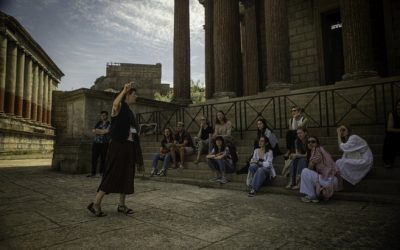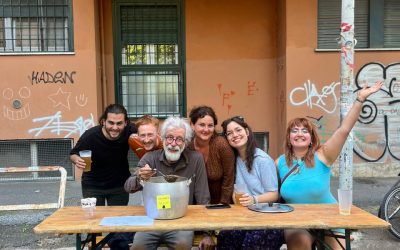Intercultural dialogue
Cross tales between Togo and Belgium
Belgium
Belgium
Long term volunteering
Written by Emilie Lavender from Belgium
Togo Akpé kaka[1]
Cross tales between Togo and Belgium
A volunteer project in Togo is not something you do alone! There is always someone ready to accompany a yovho (white person) to the market, on an excursion or simply at the end of the street to have an aperitif. Therefore, a co-edition to share this volunteering experience was a natural fit! And it gives everyone the opportunity to give their opinion on the same experience.
The “Introduction to computers and film-debate” project started on Monday 22 August at 8.30 am and all the children of the Zomayi district in Kpalimé were there! So, as self-respecting Togolese, half of the national volunteers arrived at 6.30 pm! On the other hand, the international volunteers, who were very punctual, found themselves totally disoriented by this direct dive into the project! Fortunately, among the Togolese volunteers, several were not at their first intercultural experience, and they knew how to put the others at ease: background music, discussions, jokes, a few beers, a good meal (not too spicy) and off we went!
We were a group of 9 volunteers, 7 nationals and 2 internationals, and gender-wise it was just as unbalanced: 7 men and 2 women! Was the atmosphere exclusively Togolese and male? No, absolutely not! We did everything together for 3 weeks: we were divided into teams for chores (washing up, cooking, cleaning, etc.), we animated the children, prepared the lessons, went out, had fun…
In fact, as far as fun is concerned, some evenings between volunteers will remain engraved in the annals of Astovot[2]! One of the most memorable was the “Delta rencontre Karo[3]” evening. Apart from the fact that we gained a better understanding of the relationship with each other, the importance of values, the sense of compromise to achieve a common goal, it was also difficult not to burst out laughing! The grimaces of some to share their discontent and the inability to communicate through the words of others made the activity very comical. Game nights in a bar or at the association’s centre also made our cheeks ache. Don’t challenge a Togolese to a guessing game, they are so observant that they are unbeatable!
One of the most memorable moments of the project was the relationship with the children. We had about forty students aged 11 to 19, who were motivated every morning to know everything about Word, Excel, Paint and all the other programs. We also tried to make them aware of the dangers of the virtual world and digital tools. And we made a short film with them as actors. It was exciting to see them learn to play a role, go through a casting process, rehearse their scenes, and “ACTION”!
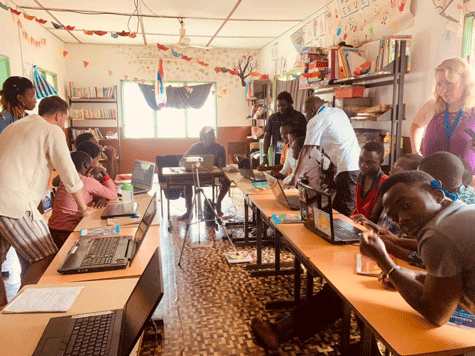
Dikkeneks[4] with humble thoughts
Admittedly, it was not an easy experience! The relationship to money is different between Togo and Belgium. And, for a Westerner, it is not always easy to find the balance between not always paying everything to everyone and enjoying these unique experiences. Moreover, when prices are not fixed, you have to negotiate! We ask ourselves if we are paying the right price, if we can afford to pay a certain amount and we don’t think it’s necessary to negotiate, etc. Then we discuss with each other and we decide whether or not we can afford to pay a certain amount. Then we discuss amongst ourselves and we realise that, for the same activities, we have not always paid the same price… In short, accepting the fluctuation of prices and that it is not personal, allows us to have a better stay.
On the Togolese side, intercultural exchanges are not always easy either. We are confronted with Western clichés about Africans. Some of them are painful (like the surprise that intellectual debates are possible), others are more comical (there are misunderstandings when we try to avoid problems for the international volunteers and forget to explain what is going on). Secondly, social codes are not always the same, and it can be quite surprising to see, for example, how easy it is for Westerners to smoke in public. Although Western volunteers are trained before starting a project, some of their language may be shocking. For example, after spending a few weeks on a project with children, some people take pride in having brought them out of poverty…
Eyizandé, see you soon!
The key to a successful intercultural project is to be able to compromise. You can’t stay in your rigid way of working when you work with people from different backgrounds. You have to adapt and do things according to the context. At the Astovot centre, the spaces are shared between several projects with different objectives, audiences, needs and time frames. Adaptation also involves timetables. For example, in Togo the whole household is awake at 6am: the mama is putting away her dishes, the rooster has already crowed three times and the children are playing in the yard. Sleeping in is something to be negotiated, even when you come home after a festive evening. 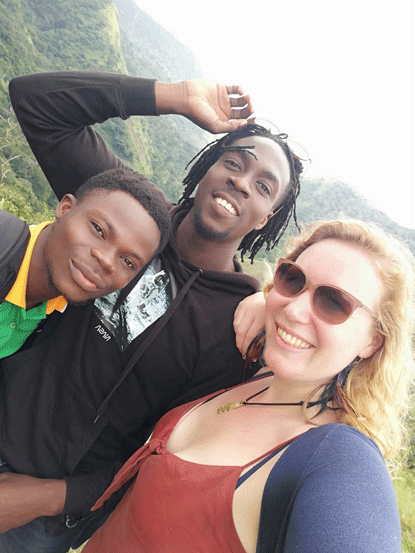
Having to get up at chicken time was not the only surprise of this intercultural exchange. Both the Togolese and the Belgians were fascinated by each other’s way of celebrating. To see for the first time a group of Togolese taking djembes, an empty glass bottle, creating music, dancing and singing childhood rhymes with a powerful enthusiasm, is impressive! On the other hand, to see a Belgian woman drinking beer after beer, dancing until the end of the night, getting a whole group to follow her and being ready the next morning to give a computer course, is amazing! But not as surprising as seeing the adaptability of the internationals in preparing European dishes with the rudimentary utensils of a work camp and Togolese ingredients.
Basically, we were very lucky with our group of volunteers. We were able to learn about each other’s cultures, to have common discussions about romantic and sexual relationships, but also about more difficult subjects such as violence in children’s education. The Togolese love to talk about their vision of love, commitment and valuing the other being strong elements of the couple. This vision is refreshing when we are used to hearing about the importance of independence and individual freedom…
But with all that, on a personal level, what did this cultural exchange bring us? The advantage is that we were not at our first contact with another culture, nor were we lacking in curiosity to learn more. The work of deconstructing clichés had already matured in our minds and we were not surprised that once again, all the qualities and defects of the human spectrum were to be found in each other. Looking back, this cultural exchange has above all given rise to a great friendship, with mutual support, continuous exchanges, complicity and strong bonds, because they were born in common values and in respect for each other.
In Togo, I will come back…
This kind of experience puts into perspective what is taken for granted by Westerners.By the way, the culture shock rather occurred on my return to Belgium. Returning to a Western way of working based on efficiency and profitability is hard after a month in West Africa. In Togo, we take things as they come: sometimes there are moments of emptiness, and then suddenly everything falls into place quickly. We adapt, we don’t get victimised and we keep going with strength.
Among the violence of the return, we cannot ignore the clash between an individualist system and a community system. Mind you, this does not systematically imply the cliché of an African way of functioning as marked by “more generosity and kindness”. But over there, when you are looking for more involved human contacts, at least you are served. The counterpart being that it can sometimes be difficult to find some solitude and independence.
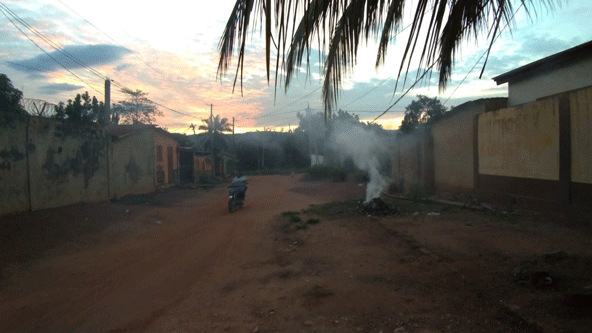 Living this kind of experience gives you the opportunity to realise that the world goes far beyond our imagination and that what we think is an absolute truth is in some way only our own truth. Between the learnings and the people who come our way, these cultural interactions sometimes allow us to chart a life course. These projects, these exchanges, remain suspended moments. We meet people who bring out the best in us, and then we say goodbye and suddenly we are all back on a different continent.
Living this kind of experience gives you the opportunity to realise that the world goes far beyond our imagination and that what we think is an absolute truth is in some way only our own truth. Between the learnings and the people who come our way, these cultural interactions sometimes allow us to chart a life course. These projects, these exchanges, remain suspended moments. We meet people who bring out the best in us, and then we say goodbye and suddenly we are all back on a different continent.
For Belgium: Emilie Lavender, SCI volunteer
For Togo: Francis Bongo, volunteer at Astovot
- [1]Togo, thank you very much !
- [2]“Association Togolaise des Volontaires au Travail“, our host organisation
- [3]“Delta rencontre Caro” ( Delta meets Caro) is a teaching tool that puts participants in a situation to help them become aware of the different dimensions of an intercultural encounter.
- [4] « Dikkenek » is a Brussels expression for a ‘fat neck’ (literal translation from Dutch), a braggart, a ‘loudmouth’, a ‘know-it-all’.
You can still join!
Want to have your own volunteer experience for peace?
Read more Voices of Volunteers

